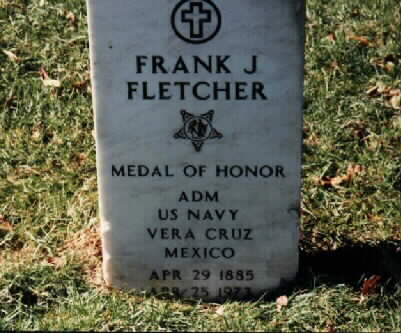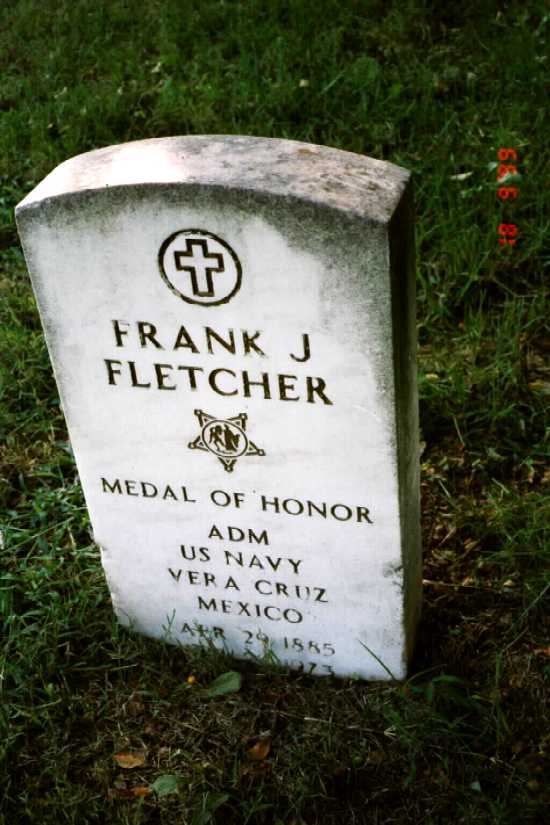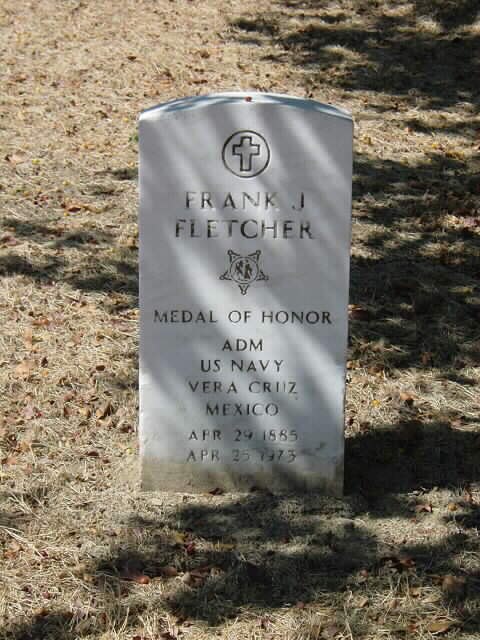Born on April 29, 1885 at Marshalltown, Iowa, he graduated from the United States Naval Academy in 1906 and commissioned as an Ensign two years later. His first sea command was aboard the USS Dale in the Asiatic Squadron, 1909-12. In April 1914, during the occupation of Vera Cruz, Mexico, he won the Medal of Honor for the rescue of refugees on the transport Esperanza. In 1914-15 he was Flag Lieutenant of the Atlantic Fleet. During World War I, he commanded the destroyer USS Benham on submarine patrol. He also saw action in the suppression of the Philippine Uprising in 1924.
He graduated from the Naval War College in 1930, the Army War College in 1931 and in 1933-36 was aide to the Secretary of the Navy; in 1936-39 he was on the staff of the Bureau of Personnel. Promoted to Rear Admiral in 1939, he was assigned to command of Cruiser Division 3, Atlantic Fleet.
Late in 1941, he was given command of the carrier USS Yorktown and an attending Task Force of two cruisers and four destroyers in the Pacific. He took part, under Admiral William F. Halsey, Jr., in raids on the Marshall and Gilbert Islands in February 1942, the first US Navy offensive actions against Japan. In March he took part in the naval attack on New Guinea. Shortly after this he was promoted to Vice Admiral and was in command of the combined USS Yorktown-USS Lexington Task Forces (later under Admiral Aubrey W. Fitch). On May 7-8, he and Fitch, who had tactical command of the battle, engaged a larger Japanese carrier force in the Battle of the Coral Sea, the first sea battle in history to be fought entirely in the air. In that battle, often considered to mark the end of the US defensive phase of the war in the Pacific, U.S. forces suffered heavily – especially with the loss of the USS Lexington – but succeeded in ending the threat of invasion at Port Moresby and Australia.
After making repairs to the USS Yorktown at Pearl Harbor, he steamed at full speed for Midway Island, 5000 miles distant, and there joined a carrier force under Admiral Raymond A. Spruance for the Battle of Midway, June 3-6, where the Yorktown was damaged and then sunk. The sinking of four Japanese carriers however made the battle a turning point of the war. In August he commanded an Expeditionary Force sent against Guadalcanal, under the overall command of Admiral Robert L. Ghormley, and escorting Admiral R. Kelly Turner's South Pacific Amphibious Force. In heavy fighting that followed that landing, he commanded the carrier strike force, comprising USS Enterprise, USS Saratoga and USS Wasp. In an engagement on August 23, the Battle of the Eastern Solomons, left his force badly damaged. In December 1943, placed in command of U.S. Naval Forces in the North Pacific Area, which post he held until 1945.
Following the Japanese surrender, he oversaw the occupation of Northern Japan. After the war he served as Chairman of the General Board of the Navy until his retirement in May 1947.
He died at Bethesda Naval Hospital, Bethesda, Maryland, on April 25, 1973 and was buried in Section 2 of Arlington National Cemetery.
He was the nephew of Admiral Frank Friday Fletcher, also a Medal of Honor recipient at Vera Cruz, Mexico, in 1914.
FLETCHER, FRANK JACK
Rank and organization: Lieutenant, U.S. Navy. Place and date: Vera Cruz, Mexico, 21 and 22 April 1914. Entered service at: Iowa. Born: 29 April 1885, Marshalltown, lowa. G.O. No.: 177, 4 December 1915.
Citation
For distinguished conduct in battle, engagements of Vera Cruz, 21 and 22 April 1914. Under fire, Lt. Fletcher was eminent and conspicuous in performance of his duties. He was in charge of the Esperanze and succeeded in getting on board over 350 refugees, many of them after the conflict had commenced. Although the ship was under fire, being struck more than 30 times, he succeeded in getting all the refugees placed in safety. Lt. Fletcher was later placed in charge of the train conveying refugees under a flag of truce. This was hazardous duty, as it was believed that the track was mined, and a small error in dealing with the Mexican guard of soldiers might readily have caused a conflict, such a conflict at one time being narrowly averted. It was greatly due to his efforts in establishing friendly relations with the Mexican soldiers that so many refugees succeeded in reaching Vera Cruz from the interior.


FLETCHER, FRANK JACK
- ADM US NAVY
- SPANISH AMERICAN WAR, WORLD WAR I, WORLD WAR II
- DATE OF BIRTH: 04/29/1885
- DATE OF DEATH: 04/25/1973
- BURIED AT: SECTION 2 SITE 4736-E
ARLINGTON NATIONAL CEMETERY
Michael Robert Patterson was born in Arlington and is the son of a former officer of the US Army. So it was no wonder that sooner or later his interests drew him to American history and especially to American military history. Many of his articles can be found on renowned portals like the New York Times, Washingtonpost or Wikipedia.
Reviewed by: Michael Howard

